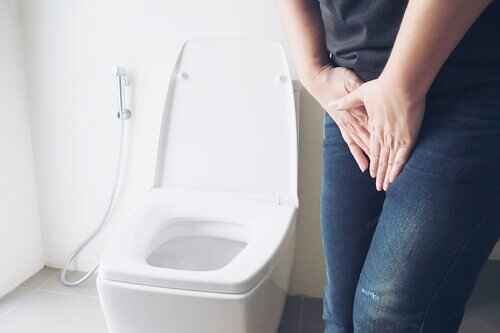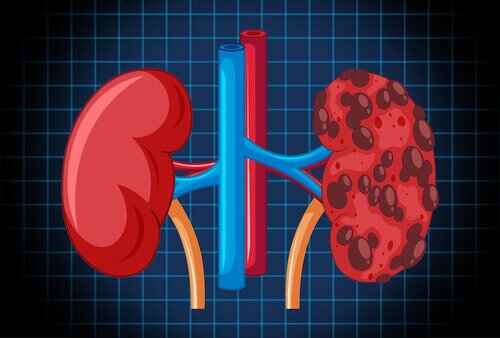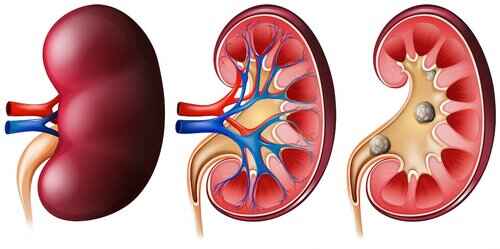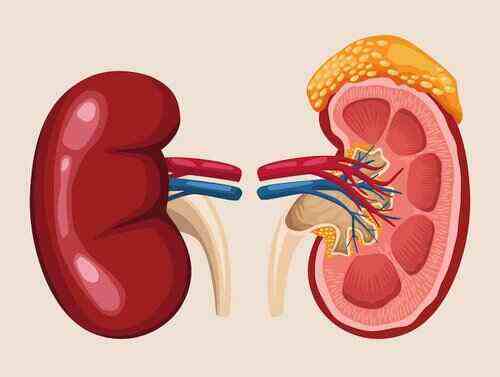
Feb 29 , 2024
Suffering from kidney discomfort can severely interrupt your daily routine, leaving you grappling for solutions.
If you find yourself grappling with kidney pain presently, take solace in the fact that you're not navigating this journey alone.
Globally, millions encounter kidney-related challenges, making it imperative to comprehend the underlying causes, symptoms, and strategies for managing such discomfort.
While we advocate consulting a urologist for anyone grappling with kidney pain, there exist numerous home-based techniques to alleviate such discomfort.
Here, you'll delve into the primary triggers of kidney pain and discover effective home remedies.
If you or a cherished one find yourselves contending with mild to moderate kidney discomfort, the remedies listed below promise respite.
It's paramount to understand that although kidney pain commonly signals urinary issues, it could serve as a red flag for a more severe condition.
Should kidney pain persist, intensify, or manifest alongside additional symptoms, promptly seek guidance from your urologist.

Delving into the realm of renal discomfort, one must navigate through a labyrinth of diverse factors and underlying conditions.
To unveil the mysteries of kidney pain, a comprehensive grasp of its origins is paramount for accurate diagnosis and efficient treatment.
Embark on a journey through the intricacies of renal distress, where the following culprits often reign supreme:

Urinary Tract Infections (UTIs) occur when bacteria enter the urinary system, commonly affecting the bladder but can ascend to the kidneys.
When bacteria reach the kidneys, they can cause an infection known as pyelonephritis, leading to kidney pain.
The infection triggers inflammation and irritation in the renal tissue, resulting in discomfort or aching sensations in the lower back or sides, commonly referred to as kidney pain.
If left untreated, UTIs can progress to more severe kidney infections, potentially causing complications such as kidney damage or sepsis.
Therefore, prompt diagnosis and treatment are essential to alleviate symptoms and prevent further complications.

Renal or kidney infection, medically termed pyelonephritis, can cause kidney pain due to inflammation and swelling of the kidney tissue.
This infection often results from a bacterial invasion, typically originating from the bladder and ascending to the kidneys through the ureters.
As the infection progresses, it triggers an immune response, leading to swelling, pressure, and irritation within the kidney. This inflammation irritates the surrounding nerves, causing intense kidney pain.
Patients may experience sharp or dull aches in the flank area, lower back, or side, characteristic of kidney pain, often accompanied by other symptoms like fever, nausea, and urinary symptoms.

Kidney stones, solid masses formed from crystals in the urine, can obstruct the urinary tract, leading to kidney pain.
When these stones become lodged in the narrow passages of the urinary system, they can cause intense pain as the kidneys attempt to expel them.
This pain typically manifests as a sharp, stabbing sensation in the lower back or abdomen, known as kidney pain.
Additionally, the presence of kidney stones can irritate the lining of the urinary tract, further exacerbating discomfort and contributing to the sensation of kidney pain.

A bladder infection, also known as cystitis, can lead to kidney pain when left untreated or if it spreads to the kidneys, causing a condition called pyelonephritis.
Bacteria from the bladder can travel up the ureters to the kidneys, leading to inflammation and infection.
This can result in symptoms such as kidney pain, often felt in the back or side of the affected area.
The pain arises as the kidneys become inflamed and swollen due to the infection.
Prompt treatment of bladder infections can help prevent the spread to the kidneys and alleviate kidney pain.
Delving into the origins of your kidney pain, let's now explore effective home remedies to mitigate this discomfort.
Given that urinary tract issues such as UTIs, bladder infections, and kidney infections often underlie kidney discomfort, here are several strategies to alleviate urinary tract-related kidney pain:

Cranberry juice offers more than just a refreshing taste; it's also renowned for its potential health benefits, including alleviating kidney pain.
As a natural diuretic, cranberry juice can help flush out toxins and bacteria from the kidneys, reducing the risk of infections that may cause discomfort or pain.
Additionally, it contains compounds that inhibit the adhesion of certain bacteria to the urinary tract, potentially preventing further issues.
For those seeking kidney pain treatment at home, incorporating cranberry juice into their daily routine may provide relief and promote urinary tract health.
However, it's important to note that severe or persistent kidney pain should always be evaluated by a healthcare professional to determine the underlying cause and appropriate treatment.
While cranberry juice can be a helpful addition to home care, it's not a substitute for professional medical advice or treatment when necessary.

Parsley juice is a potent home remedy that has been utilized for centuries, offering a myriad of health benefits, including potential relief for kidney pain.
Kidney pain treatment at home often involves natural remedies like parsley juice, known for its diuretic properties that help flush out toxins from the kidneys, reducing inflammation and discomfort.
Rich in antioxidants, vitamins, and minerals, parsley juice not only aids in detoxification but also supports overall kidney health.
Regular consumption of parsley juice may alleviate kidney pain by promoting proper kidney function and preventing the formation of kidney stones.
Its anti-inflammatory properties can soothe existing discomfort, providing relief without the need for medication.
Incorporating parsley juice into your daily routine can be an effective and natural way to manage kidney pain at home.

Non-aspirin painkillers like acetaminophen or ibuprofen are commonly used to alleviate various types of discomfort, including kidney pain.
However, it's crucial to use them cautiously and according to the recommended dosage.
Kidney pain treatment at home often involves these over-the-counter medications to manage mild to moderate pain.
Ibuprofen, for instance, can help reduce inflammation and alleviate discomfort associated with kidney issues.
Acetaminophen is another option, but individuals with kidney problems should consult a healthcare professional before using it, as it can affect liver function.
Additionally, home remedies such as applying heat packs or taking warm baths may provide some relief for kidney pain.
Nevertheless, if the pain persists or worsens, it's essential to seek medical attention promptly to address any underlying conditions causing the kidney pain.

Staying hydrated is crucial for overall health, including kidney function.
Adequate hydration helps flush out toxins and prevent kidney problems.
To prevent kidney pain, ensure you drink plenty of water throughout the day.
Dehydration can lead to concentrated urine, increasing the risk of kidney stones or infections, which can cause discomfort.
For kidney pain treatment at home, besides staying hydrated, certain steps can help alleviate discomfort.
Applying a heating pad or warm compress to the affected area can provide relief by relaxing muscles and improving blood flow.
Over-the-counter pain medications like ibuprofen or acetaminophen may also help manage mild kidney pain.

Taking probiotics can contribute to overall gut health, potentially aiding in kidney pain treatment at home.
While probiotics primarily support digestive health, their benefits extend to reducing inflammation and enhancing immune function, which can indirectly alleviate kidney discomfort.
By maintaining a balanced gut microbiome, probiotics may help mitigate factors contributing to kidney issues.
However, it's essential to consult a healthcare professional for proper diagnosis and treatment recommendations, especially if experiencing persistent kidney pain.
Incorporating probiotics into your daily regimen alongside other healthy habits may complement holistic approaches to managing kidney discomfort from the comfort of home.

For kidney pain treatment at home, consider taking a warm Epsom salt bath.
Epsom salt, rich in magnesium, can help relax muscles and potentially alleviate discomfort associated with kidney pain.
Dissolve a cup of Epsom salt in warm bathwater and soak for 20-30 minutes.
The warmth of the water combined with the mineral properties of Epsom salt may provide relief from kidney pain.
However, if you experience severe or persistent symptoms, it's essential to consult with a healthcare professional for proper diagnosis and treatment.
Remember, home remedies like this can complement medical advice but should not replace it.

Monitoring your alcohol consumption is crucial for managing kidney pain at home.
Excessive alcohol intake can exacerbate kidney issues by causing dehydration and placing strain on the kidneys.
By tracking your alcohol intake and limiting or abstaining from it altogether, you can reduce the workload on your kidneys and promote their proper function.
This, coupled with staying well-hydrated with water and maintaining a balanced diet, can alleviate kidney pain and support overall kidney health without the need for medical intervention.
Regular monitoring allows for better management and prevention of kidney-related discomfort, fostering a healthier lifestyle.

Adding citrus fruits like lemon or lime to your water can aid in kidney pain treatment at home.
Citrus fruits are rich in citrate, which can help prevent kidney stone formation by binding to calcium and inhibiting crystallization.
Additionally, citrus fruits are high in antioxidants and vitamin C, which can help reduce inflammation and promote overall kidney health.
Drinking citrus-infused water also helps to keep you hydrated, which is crucial for maintaining proper kidney function and flushing out toxins.
Therefore, incorporating citrus into your water intake can be a simple yet effective home remedy for alleviating kidney pain.

Choosing acidic beverages like cranberry juice or lemon water can help in kidney pain treatment at home.
Acidic beverages can potentially help dissolve kidney stones or prevent their formation by increasing urine acidity, which may reduce the risk of stone formation.
Additionally, these beverages can aid in flushing out toxins and promoting hydration, which is essential for kidney health.
However, it's important to consult a healthcare professional for proper diagnosis and treatment, as kidney pain can be indicative of various underlying conditions requiring specific interventions.

Apple cider vinegar is believed to aid in kidney pain treatment at home due to its potential to alkalize the body and flush out toxins.
It may help dissolve kidney stones and alleviate discomfort.
Consuming diluted apple cider vinegar regularly can potentially prevent the formation of new stones and reduce inflammation in the kidneys, thus relieving pain.
However, it's essential to consult a healthcare professional before using it as a treatment, especially if you have underlying kidney issues or are taking medication, to avoid any adverse effects.

Drinking hydrangea or dandelion root tea can aid in kidney pain treatment at home due to their diuretic properties, promoting increased urine production and potentially helping to flush out toxins and reduce inflammation in the kidneys.
Hydrangea tea is believed to have anti-inflammatory effects on the urinary tract, while dandelion root tea may support kidney function by promoting the excretion of waste and excess fluids.
However, it's important to consult a healthcare professional before using herbal remedies, especially if you have pre-existing health conditions or are taking medications.

Watermelon can be beneficial for treating kidney pain at home due to its high water content, which helps in flushing out toxins and promoting hydration.
Additionally, watermelon is a natural diuretic, encouraging increased urine production and aiding in the elimination of waste products from the kidneys.
It also contains potassium, which can help regulate fluid balance and prevent kidney stones.
Consuming watermelon regularly may alleviate kidney pain and promote overall kidney health when incorporated into a balanced diet and lifestyle.
However, it's essential to consult a healthcare professional for severe or persistent kidney pain.

Kidney bean broth can be a soothing remedy for kidney pain at home due to its natural diuretic properties.
The broth helps flush out toxins and excess fluids from the kidneys, potentially alleviating discomfort.
Additionally, kidney beans are rich in antioxidants and nutrients like magnesium and potassium, which support kidney health.
Consuming kidney bean broth regularly may aid in reducing inflammation and promoting overall kidney function.
However, it's essential to consult a healthcare professional for persistent or severe kidney pain.

Using a hot compress at home can provide relief for kidney pain by increasing blood flow to the affected area, which can help to reduce muscle tension and alleviate discomfort.
The warmth from the compress also helps to soothe and relax the muscles around the kidneys, easing the pain.
Additionally, the heat can promote relaxation and decrease stress levels, which may further alleviate discomfort associated with kidney pain.
However, it's important to consult a healthcare professional for proper diagnosis and treatment recommendations if kidney pain persists or worsens.

Moderating your calcium intake can be beneficial for managing kidney pain at home.
Excessive calcium consumption can contribute to the formation of kidney stones, which can lead to discomfort and pain.
By controlling your calcium intake, you can reduce the risk of stone formation and alleviate kidney pain.
Focus on consuming calcium-rich foods in moderation and ensure you stay hydrated to help prevent the development of kidney stones.
Additionally, consult with a healthcare professional for personalized guidance on managing your calcium intake and kidney health.
If you're experiencing kidney pain, it's essential to promptly consult a urologist, especially if home treatments don't provide relief or if the pain worsens.
While some cases of kidney pain may be due to temporary issues like dehydration or muscle strain, others could signify more severe conditions like kidney stones, infections, or kidney disease, which require professional medical attention.
If your pain is persistent, accompanied by other symptoms such as fever, nausea, vomiting, blood in urine, or difficulty urinating, it's crucial to see a urologist promptly.
However, for mild kidney pain without these accompanying symptoms, you can try home treatments such as staying hydrated, applying heat pads, avoiding strenuous activities, and over-the-counter pain medications.
Nevertheless, always seek medical advice if the pain persists or if you're unsure about its cause to ensure proper diagnosis and treatment.
Managing kidney pain at home requires a multifaceted approach that addresses underlying causes, relieves symptoms, and promotes overall kidney health.
By incorporating home remedies, lifestyle changes, and alternative therapies into your daily routine, you can effectively alleviate kidney pain and support long-term kidney function.
However, it's crucial to consult a healthcare professional for proper diagnosis and personalized treatment recommendations, especially if your symptoms persist or worsen over time.
